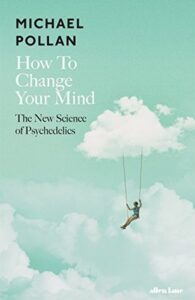 How to Change Your Mind: The New Science of Psychedelics, Michael Pollan
How to Change Your Mind: The New Science of Psychedelics, Michael Pollan
If you’re interested in the recent findings that psychedelic drugs (like LSD and magic mushrooms) could help treat forms of depression that have proven themselves resistant to the usual standard of care, this is pretty helpful in many ways as a survey of how LSD et al were originally perceived, how and why things changed, how a psychedelic experience feels, and where things are right now with research (roughly, given that anything based on research can be refined or retracted by the time the book’s printed).
It is also, however, very much about the author: his experiences with various different psychedelic substances take up a whole chapter, and another chapter is given over to the hunting of mushrooms (and the descriptions of a psychedelic trip based on those, too). It’s a very personal history, though I feel that Pollan does make his biases and prejudices — and how they changed with the research — pretty clear, so the unwary reader is still aware that some of this is coloured by opinion.
It sounds like psychedelics are a pretty promising avenue not just for treatment-resistant depression, but for quite a few other mental health issues too. I don’t think that I’m ever likely to see out psychedelics recreationally: the described dissolution of the ego and changed perceptions don’t really appeal to me, and I’d rather find my oneness with the universe through meditation and just trying to be a good person. The one way in which it appeals to me is the finding that it often changes people’s relationship to death (having been used with great success as part of palliative care). As someone with 10-15 years of constant anxiety about my health and anxious predictions of my imminent death under my belt, the idea of feeling able to let that go to some extent sounds very appealing… if only there were an exact science to having the kind of trip that leads to that outcome.
There are a few things that bother me about the current perception that psychedelics could be a panacea for almost all mental health problems, and to his credit, Pollan does discuss them despite his enthusiasm. One is the near-impossibility of randomised controlled studies; another is the impossibility of tightly controlling all the variables when psychedelic drugs are used, because people’s experiences depend highly on their setting and their mental state beforehand, and crucially, what they expect to happen. As soon as you’ve got someone’s informed consent for a psychedelic to be administered, you’ve changed the outcome of their trip.
Finally, we’ve had seemingly amazing breakthroughs in mental health treatments before, but over time they have lost their efficacy — repeat studies on antidepressants like fluoxetine (Prozac) now find far smaller effects, even when everything is carefully controlled. It’s not entirely clear why that is, so it is also unclear whether that will apply to psychedelics as well, and to what extent.
In any case, Pollan’s book is an interesting survey of the history and the state of the field now, and well worth it if you’re interested in the topic.

Leave a Reply